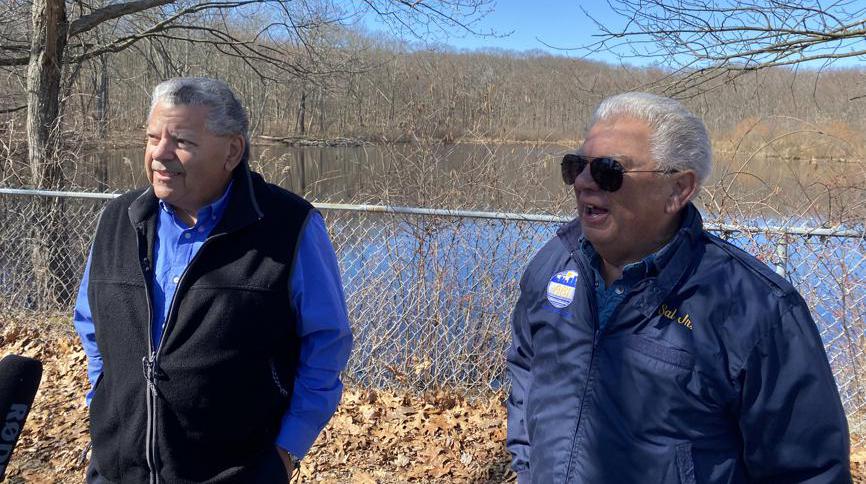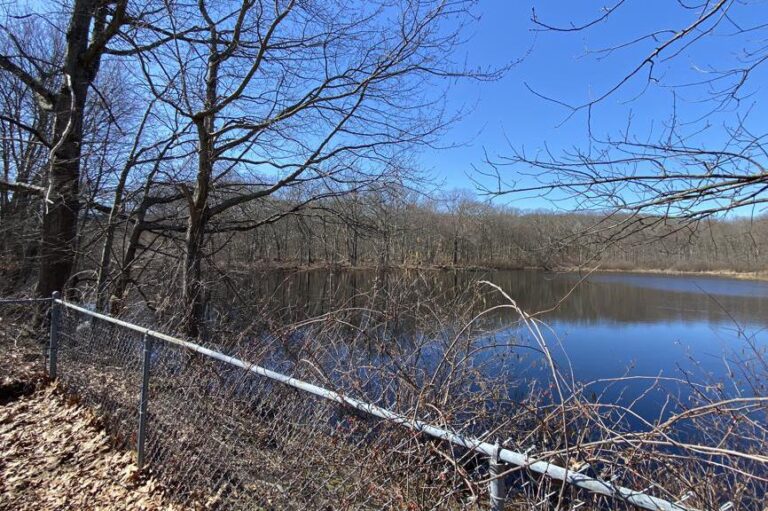
JOHNSTON, R.I. — For generations, Salvatore Compagnone‘s family has built homes.
He remembers how his father built three houses for himself and his siblings, not far from a pond in Johnston, R.I., where he had spent time in his childhood in the 1930s. His father swam there in the summer. When the water froze over, he’d skate, Compagnone recalled.
“This was his playground,’’ Compagnone said last week as he stood not far from the water’s edge.
And his father had a dream for that property: a vision to build an apartment complex.
While his father died last year at the age of 95, Compagnone is now fighting to keep that dream alive, alongside fellow builder and longtime friend Ralph Santoro and Santoro’s sister, Lucille Santoro. Together, the three of them collectively co-own the 31-acre site after their fathers purchased it in the 1980s, they said.
Earlier this month, the Town of Johnston formally seized the property off George Waterman Road by eminent domain.
“It was like we were physically assaulted,’’ Santoro said. “I felt like someone had punched me in my gut.’’
Compagnone felt the same way: “It hurt. You see your father’s dream, and we can’t get there — that’s all I can say.’’
The seizure was swift: In December, the developers brought a proposal before town officials to construct a 252-unit apartment complex there, with one- and two-bedroom residences catering to low- and moderate-income tenants.
But those plans faced backlash, and Mayor Joseph Polisena Jr. vowed to “use all the power of government that I have to stop it.’’
By January, Polisena moved to take the property by eminent domain, arguing the site would be ideal for a new Town Hall and a public safety complex, as the town’s police and fire stations have fallen into disrepair over the years.
Polisena said he has searched — with emails to prove it — for a location for those facilities since not long after he was sworn in two years ago, succeeding his father, Joseph Polisena Sr., who was mayor for 16 years.
To fund the new projects, he said, the town will forgo plans to construct a new high school and opt instead to renovate the existing building, as originally planned.
With Town Council approval, officials finalized the taking in court on March 14, dropping off a check for $775,000 — the site’s assessed value.
Last week, however, US District Court Judge Melissa R. DuBose granted a motion for a temporary restraining order filed by attorneys for Compagnone and the Santoro family. The order blocks town officials from taking further action while the matter is resolved in court, according to one of the attorneys, Kady Valois, of the Pacific Legal Foundation, a California-based nonprofit public interest law firm.
Another order from a Providence Superior Court judge last week effectively returned the property to Compagnone and the Santoro family, said Kelley Morris Salvatore, an attorney from Providence law firm DarrowEverett, who is also representing the trio.
Both matters are due back in court in April.
“The recent court decision simply means that the status quo is preserved,’’ Polisena said in a statement last week. “We will continue to make our case.’’
In court filings and in conversation with reporters, Morris Salvatore and Valois allege town officials took the property to block the proposed housing development and said they believe Johnston does not actually have any intention of building the new municipal complex.
The town “simply wants to stop affordable housing, something that is much needed here and across the United States,’’ Valois said.
Under state law, eminent domain can be used to acquire land for “public ownership and use’’; for roads, bridges, highways, and utilities; to provide a “good and marketable’’ property title-free liens; and to eliminate “an identifiable public harm and/or correcting conditions adversely affecting public health, safety, morals, or welfare.’’
“Eminent domain is an awesome power, and it must be used carefully,’’ she added. “It’s considered a last resort for a reason. But here, the town has weaponized that power, not to help the public, but to prevent a use it doesn’t like.’’
Ralph Santoro and Compagnone said they wanted to finally build their project because of the housing crisis embroiling Rhode Island: In Johnston, about only 7 percent of the housing stock is considered affordable.
“Right now, you can work in Johnston, but not live here, and that’s a clear message we’re getting from the mayor and the Council,’’ Ralph Santoro said. “So I don’t think that they’re speaking to their residents. I don’t think they’re doing just by the residents here.’’
The two builders said rents for apartments in the development would probably range between $1,850 to $2,100, which Ralph Santoro described as “extremely reasonable’’ in the state’s rental market.
“My grandson just became a teacher this year, and he can’t afford a $600,000 house, but he can move into one of these apartments, and that’s what we’re hoping for,’’ Compagnone said.
Polisena has strongly rejected the notion the town does not intend to build at the site, and told the Globe last week that given that argument, it will be “super awkward’’ when officials eventually hold a ribbon-cutting ceremony at the new buildings.
“I have no intention of succumbing to these developers or their elitist, California-based legal organization,’’ he said in his statement.
“This is about prioritizing the future of Johnston and its current taxpayers — not about some rich developers making a major profit.’’
But Ralph Santoro said he and Campagnone are “certainly not wealthy land developers.’’
“We work with blood, sweat, and tears every day,’’ he said. “My father came from Italy with nothing. He was an immigrant. He taught us this was the greatest place to live. … He stressed hard work with us. That’s what we do every day of the week. All we’re trying to do is make a living, OK, and provide affordable homes.’’
Christopher Gavin can be reached at christopher.gavin@globe.com.


